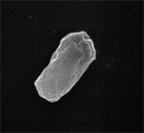Mycobacterium MCS was isolated from soil in a wood preservative-contaminated land-treatment unit where remediation of polycyclic aromatic hydrocarbon (PAH) was occurring. This isolate mineralizes small- and large-ring PAHs, in contrast to other PAH-degrading microbes. Bioremediation of PAHs offers an attractive solution to pollution clean-up because it can occur on site and at relative little cost compared to alternatives. This isolate belongs to a fast-growing group of the mycobacterium genus that is defined as Gram-positive, acid-fast, pleomorphic, non-motile rods belonging to the order Actinomycetales and characterized by distinctive cell surface mycolic acid derivatives. In contrast, members of the slow-growing group of Mycobacteria have notoriety in causing human and animal diseases. Thus, the genome sequence of the Mycobacterium isolate MCS will permit extensive comparisons to the genomes of the pathogenic isolates, as well as, an understanding of the pathway for PAH degradation and survival mechanisms in polluted conditions. |
||
|
||
Mycobacterium sp. MCS

